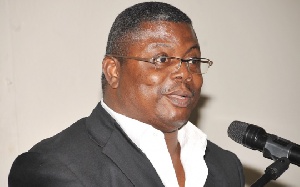A Deputy Commissioner of the Commission on Human Rights and Administrative Justice (CHRAJ) Mr Richard Quayson has said the Ghana Beyond Aid mantra espoused by President Nana Akufo-Addo will be a mirage if corruption is not stemmed.
He noted that indiscipline and lawlessness added to corruption put Ghana at a disadvantage in the fight against the national canker thereby militating against the rapid socio-economic development of the nation.
Mr Quayson was addressing a workshop as part of the National Anti-Corruption Action Plan (NACAP) Regional Stakeholders Awareness Campaign-2018 at Sekondi in the Western Region.
It was organised by the Ghana Integrity Initiative (GII) in conjunction with the Ghana Newsn Agency (GNA) and CHRAJ with funding from Global Affairs-Canada.
Representatives from the Ghana Police Service, Ghana Immigration Service, Attorney General's Department, CHRAJ, Media, Ghana Education Service, Ghana Health Services, BNI, Information Services Department, MDAs Regional Coordinating Council, NCCE, Public Service among others participated in the workshop.
Mr Quayson outlined that Africa loses $100 billion annually through corruption with Ghana losing over $3bn equivalent to GH¢13.8bn,an amount which represents over 300 per cent of all foreign aid Ghana receive in a year and 25 per cent of the 2016 annual budget estimates.
He said on the average, Ghana lost 20 per cent of the national budget to corruption which could improve the livelihoods of the citizenry and strengthen institutions.
Mr Quaye warned that a severe water crisis looms ahead of Ghana by 2030 and this required $11.3bn as investment in the water sector which must not give room to corruption.
The Commissioner said corruption, indiscipline and wanton disregard for the law were not only killing industrialisation but schools, hospitals, roads among others adding, that Ghana and Africa could be transformed if all anti-social forms of behaviour were nipped in the bud and abate the bad partisan politics.
Mr Quayson said the NACAP ten-year national strategy to fight corruption demands a national cultural renewal programme to make corruption unattractive and admitted that almost everyone was directly or indirectly involved in corruption in one way or the other and called for a concerted effort to deal with the canker.
The Western Regional Minister, Dr Kwaku Afriyie noted with grave concern that it was prudent to tackle corruption from the personal to the institutional levels in all facets of endeavour.
The Minster also bemoaned the practice whereby only those in political offices were tagged with corruption excluding civil servants, churches, traditional authorities and all other categories of workers.
Dr Afriyie noted that corruption was now widespread in society thereby stagnating national and personal development with the feeling that people in public offices thought they were entitled to what they looted from national coffers.
He underscored the need to engage a national discourse in fighting corruption with notices such as "Do not offer gifts and do not accept gifts in public offices especially when gifts are relative to consequential decisions, which tend to become inducements".
Dr Afriyie observed that corruption was no longer a perception but existed even in the church which he described as schizophrenic and in chieftaincy affairs before enstoolment of chiefs.
The Western Regional Chairman of CHRAJ, Mr John Bismark Ackon said the whistle blower Act 2006 gave CHRAJ the mandate to protect persons who volunteered information against victimisation and entreated the general public to lodge complaints to the office for investigations and expeditions on issues.
He allayed the fears of volunteers adding that "confidentiality was their prime concern to protect the identity of informants".
The Deputy News Editor of the Ghana News Agency, Mr Francis Ameyibor who spoke on The Role of the Media as watchdogs in society, asked the general public to put much premium on the media to cover official assignments as their role was critical in promoting good governance and curbing corruption.
He said the crusade against corruption would bear little fruit without the media and tasked the media to investigate and report corruption, expose corrupt officials, raise public awareness and reinforce the work of anti-corruption bodies.
He charged institutions such as the National Media Commission as an advocate of press freedom and accountability.
Mr. Ameyibor also tasked the media to strengthen the citizenry to resist, condemn and report corruption and called for training of journalists on principles and techniques of investigations and reporting corruption cases.
Media houses must devote space and time and be directly involved in the fight against corruption and avoid sensationalism which could undermine the ability of Anti-Corruption agencies to stem the tide.
General News of Saturday, 25 August 2018
Source: ghananewsagency.org

















